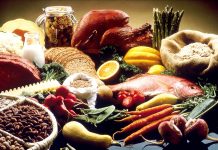
Your attempts to give sound advice on sports nutrition are appreciated. However, it seems inappropriate that you give advice on matters, which are obviously outside the realm of your experience and expertise. To suggest that a male weightlifter needs only “63 grams of protein” per day reminds me of my high school football days when the coaches wouldn’t let us drink water on very hot days because it was “too hard on the body and we would cramp up”. That advice came from people who had the credentials to call themselves experts, also.
Questions:
1) What modern research can you point to that says protein needs don’t increase with heavy muscle tissue breakdown? Modern research on sports nutrition I’ve seen indicates the time and again that protein needs to increase, often drastically, in weight training subjects. Otherwise, much less than the optimal benefit is derived from that exercise, the body simply is not afforded the opportunity to rebuild itself quickly and adequately.
2) As opposed to quantity, what is the quality of the protein ingested? Incomplete proteins may be of little or no benefit to the athlete, as you are probably well aware, but your readers may not be.
3) Regarding the specific quantity of 63 grams: Does the weightlifter weigh 150 pounds. or 300 pounds? To suggest so specific a number for ALL males, regardless of their biochemical individuality and weight variation and intensity of the workout is beyond my comprehension.
4) For your future reference as an RD, MetRx is an engineered food formulated by Scott Connelly, MD. It was originally conceived in the context of helping patients in severely catabolic states (such as burn patients) to be able to retain lean body mass through aggressive nutritional intervention. Bodybuilders found out about the product and started using it with great success to build as quickly as possible. Dr. Connelly now markets the product for those who want to recompose their body’s muscle-to-fat ratio. One serving has 37 grams of very high-quality protein and only 260 calories.
I’m approaching 40, have lifted weights for 23 years now and have read every sort of hype from both the commercial and scholarly sides for almost as many years. I am extremely fit, maintain a very low body fat percentage and workout very hard, while recovering very quickly. One thing I’ve discovered from EXPERIENCE, regardless of what a few so-called “experts” say, is that keeping lots of high-quality protein in my gut throughout the day is the key I’d been looking for in maximizing my health and physique. And I am still looking for someone to show me any research that shows high protein intake damages normal and healthy kidneys and liver in humans. That’s another one of those nutritional myths, repeated endlessly by the “experts.
Just last week, a teacher at the school here was arrogantly telling me that my diet was dangerous, that she had an MA in biochemistry. People standing around listening were snickering at her because they could see what my body and posture looked like, as she was standing there, 40 pounds overweight and smoking a cigarette. The “expert.”
The RDA for protein for adult males is 63 grams per day. Athletes can maintain protein equilibrium (muscle building equals muscle breakdown) on 1 gram of protein per kilogram of body weight per day. So take your weight, divide by 2.2 then multiply by 1. In fact, most persons can achieve protein equilibrium (positive nitrogen balance) at 0.6 to 1.2 grams of protein per kilogram per day.
According to Dr. Carol Meredith at the University of California at Davis, muscle protein synthesis decreases during exercise and nearly doubles during recovery. Research she has shows that additional protein (studies of 1.35 grams of protein per kilogram of body weight per day) does not increase muscle mass or strength. In addition resistance exercise like weight lifting is a powerful anabolic (building) process that improves protein synthesis (increased muscle mass).
In fact what athletes need is increased caloric intake (60 calories per kilogram of body weight per day) which may contain protein food sources as well. One inherent problem with increasing protein from food sources, is you are probably also increases the fat content.
The supplement you are taking is 56% protein. Remember that your body can break down protein in food and break down muscle protein for energy if insufficient calories are consumed. So you may be burning expensive protein for fuel.
In regards to incomplete proteins, you are misinformed. If a person daily eats a variety of legumes (beans, peas, nuts), seeds, tree nuts, fruits, vegetables, and grains, they will get all the amino acids an adult needs in sufficient quantity to supply all 8 essential amino acids. According to Dr. Peter Pellett at the University of Massachusetts at Amherst, the limiting amino acid is lysine, which would be a concern in persons eating only grains. I would suggest you read the vegetarian topic.
There is no food or supplement that will by itself convert fat to muscle as you indicate MetRx does all by itself. Otherwise, persons wanting to lose weight would have found instant success with it long ago. The only ways proven to lose body fat and increase muscle is through exercise both aerobic and weight training.
Burn patients lose lots of protein through the burn site which bodybuilders do not. Body builder’s protein losses are through sweat, urine, and feces, the majority of which is not protein. When a muscle is broken down during weight training, it frees amino acids into the blood which can then be recycled within the body unlike the burn patient whose protein loses are soaked up by gauze dressings. You are mixing apples and oranges.
There is lots of nutrition hype, most untrue in weightlifting and bodybuilding. While at the University of Minnesota, Duluth, I taught sports nutrition for several years, worked with college athletes, Olympic athletes, and yes-competitive bodybuilders. If you want nutrition expertise, ask a Registered Dietitian. Second, if you want exercise expertise, ask an exercise physiologist. Unfortunately, your high school coach and biochemistry teacher may not have the education and experience to provide “expert” nutrition advice. Think of the opportunity you missed with the biochemistry teacher to “teach” her what you have learned so that she could consider a more healthy lifestyle.
Lastly, remember that we are practicing nutrition like doctor’s practice medicine. Nutrition science has changed even in the length of time I have been practicing. We don’t have it perfect yet and recommendations like drinking water during exercise has changed over the years as a result of new research.
If you would like to read some good sports nutrition texts, try “The Athlete’s Kitchen” by Nancy Clark MS RD or “Sports Nutrition” by Dan Benardot Ph.D., RD. Sports nutrition for children, try “Play Hard Eat Right” by Debbi Sowell Jennings MS RD and Suzanne Nelson Steen D.Sc. RD.



